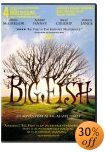 In the U.S. and Canada, BIG FISH will be coming out on DVD (and presumably, VHS) starting April 27, 2004. You can already pre-order Big Fish from Amazon and other sites.
In the U.S. and Canada, BIG FISH will be coming out on DVD (and presumably, VHS) starting April 27, 2004. You can already pre-order Big Fish from Amazon and other sites.
Big Fish
British Film Awards in London
I just returned from London, where I was attending the Orange British Film Awards, also known as the Bafta’s. Big Fish was up for seven awards, including Best Adapted Screenplay. We won exactly zero. But it was a very fun time, and truly an honor to have been nominated.
A few observations:
- Stephen Fry is much, much better than any other awards host I’ve encountered.
- The British don’t capitalize acronyms if it’s possible to pronounce them. Therefore Unicef supports people with Aids, while SBC stock is listed on the DJIA .
- Scripts are five pages shorter when printed on A4 paper, the European standard.
- The English are much smarter about binding scripts. Instead of brads, they use clips that go through two holes and fasten in the back.
- British phone numbers are wildly inconsistent. At least three times, I had to ask a native how to dial a number.
- London has an alarming number of traffic cameras. Borderline Orwellian. In Los Angeles, we have cameras that can catch you running a red light. London has cameras that can measure your average speed between two points, or determine whether your car was driven inside a certain zone on any given day, and charge you a congestion fee. Americans would revolt.
Metaphors in Big Fish
My wife and I just saw Big Fish and loved it. We spent hours talking about the metaphors you used, especially what Spectre represented. How do you decide whether to hit people over the head with it or leave it up for interpretation? And are you okay with people coming up with different interpretations?
–Pete Safran
Like pornography and irony, metaphors are hard to define, but easy to spot: “The ship plowed the sea,” or “She was a bobcat in the sack.” Ships don’t plow, and bobcats don’t sleep in beds, but in both cases the author’s intention is clear. Essentially, a metaphor uses the meaning of one term (the “meta” part) to carry over (the “phor” part) to an otherwise unrelated situation. Basically, a metaphor is a comparison — something “like” something else — but without using the word “like,” which would make it a simile.
Still with me?
In terms of Big Fish, metaphor doesn’t feel like quite the right word to describe Spectre. While there are lots of things Spectre is “like” — Heaven, Hell, the Afterlife, a ghost town, Utopia, Oz, Shangri-La — any comparisons the viewer draws are based on how he interprets the imagery and events of the scene. For instance, everyone is dressed in shimmering whites and yellows (which seems Heavenly), but the river is full of leeches and alluring sirens (not Heavenly). The town’s mayor welcomes Edward with a clipboard and finds Edward’s name (which feels like the Afterlife), but people grow old (which doesn’t).
So if you try to force just one interpretation onto Spectre, you’re going to be disappointed. And in fact, Spectre is supposed to be a lot of different things at once. It’s the mythical town that Edward was hoping to find, but he found it too quickly. It’s a poor Southern town subject to liens and bankruptcy, which only Edward can save. It’s the location of Edward’s sexual awakening (the girl in the river) and his near-affair (with Jenny Hill). If anything, it’s a beautiful trap that Edward stumbles into twice.
Interestingly, the original inspiration for Spectre was quite a lot darker. In Daniel Wallace’s novel, this section is the road out of Ashland, and features a dog that bites your fingers off. For the movie, Spectre became its own place, and the dog got moved to the circus scene.
Am I okay with people coming up with their own interpretations? Well, I have to be. Unless I want a character to explicitly state what a story element represents, there will always be different interpretations. And the point of the film is that finding the actual, hard truth behind things is often a fool’s errand. The issue of whether Edward Bloom ever visited Spectre in his youth is ultimately less important than what he said, and why.
Paperback version of shooting script now available
 Newmarket Press has published a paperback version of my screenplay for BIG FISH. You can order it here.
Newmarket Press has published a paperback version of my screenplay for BIG FISH. You can order it here.
How does the paperback compare to the .pdf version available on this site? Well, it’s the same script, but it adds a kind foreward by Daniel Wallace (who wrote the novel), a very long intro by me, photographs, and production notes. Plus, it looks better on a shelf.